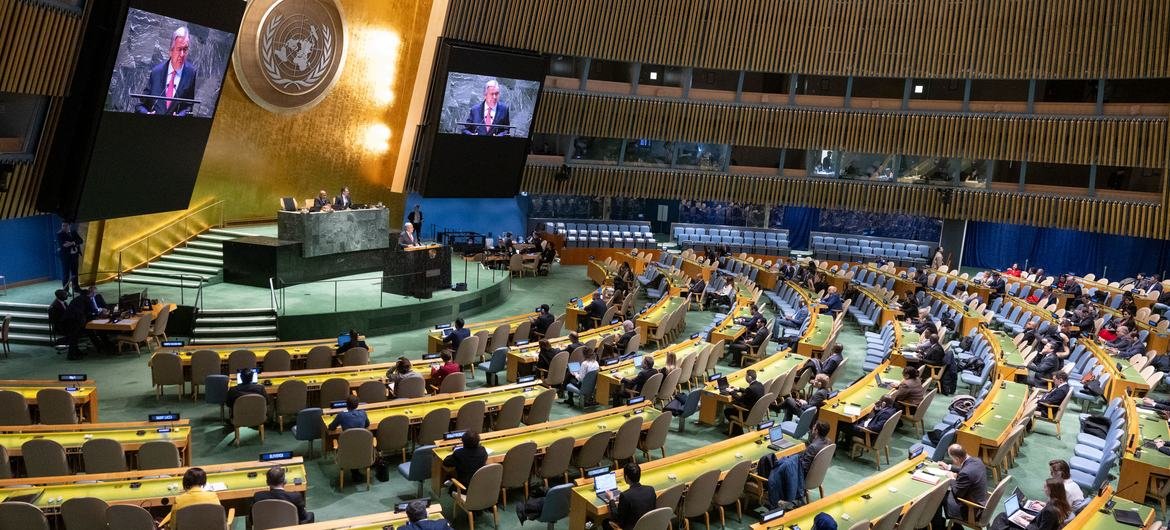Reaffirmation of Support for Ukraine
The United Nations General Assembly has recently demonstrated a robust commitment to supporting Ukraine in the face of ongoing aggression. Several resolutions passed by the General Assembly reflect a unified stance among member states that emphasizes the necessity of upholding Ukraine’s sovereignty and territorial integrity. These resolutions underscore the global commitment to defending democratic values and the principles of international law, especially in the context of territorial integrity and non-aggression.
One of the central elements of these resolutions is the overwhelming support for Ukraine’s position against the incursions by Russian forces. This support illustrates a significant consensus amongst member states, calling for the immediate and complete withdrawal of Russian military presence from all occupied Ukrainian territories. The resolutions serve as a critical reiteration of the international community’s rejection of any attempts to alter borders through force, a principle enshrined in the UN Charter.
The implications of the General Assembly’s resolutions extend beyond immediate support for Ukraine. They signify a broader strategy of international solidarity aimed at reinforcing the importance of respecting national sovereignty globally. The collective stance taken by the General Assembly strengthens diplomatic ties among nations opposing aggression, illustrating that violations of sovereignty will not be tolerated. It further positions the UN as a platform for peaceful dispute resolution and dialogue, essential tools for maintaining international order.
In light of these developments, the General Assembly’s reaffirmation of support for Ukraine serves as a vital reminder of the necessity for a cohesive global response to threats against territorial integrity and state sovereignty. As the situation in Ukraine continues to evolve, the role of international cooperation and support remains paramount in efforts to restore peace and stability in the region.
Ukraine’s Perspective and Response
In response to the ongoing aggression from Russia, Ukraine’s leadership has emphatically condemned a series of actions deemed as violations of international law and human rights. The Ukrainian representative, during various sessions at the United Nations, has articulated grave concerns regarding the humanitarian crises unfolding within the nation. These include reports of significant civilian casualties, with families being torn apart and entire communities devastated by the conflict. Furthermore, allegations of the abduction of Ukrainian children have surfaced, with claims asserting that these children are forcibly taken to Russia, raising international awareness about the severity of the situation.
Ukraine has labeled these actions as ‘genocide’, highlighting the intentional targeting of its population and culture as a methodical effort to obliterate the Ukrainian identity. This assertion seeks not only to rally international support but to reflect upon the historical context of Ukraine’s struggle for sovereignty. As the situation evolves, the call for justice and accountability against those responsible for these actions remains a focal point of Ukraine’s diplomatic efforts.
While Ukraine remains open to engaging in peace talks, this pursuit does not come at the expense of its security and territorial integrity. Ukrainian officials emphasize the necessity of maintaining a robust military and economic pressure on Russia as a downside to any negotiations. This dual approach portrays a delicate balance between seeking a peaceful resolution and ensuring that Russia is held accountable for its transgressions. The consistent messaging from Ukrainian representatives illustrates a firm commitment to sovereignty and a clear stance against aggression, depicting both the complexities of diplomacy and the pressing need for defensive readiness. As Ukraine navigates these tumultuous waters, the nation remains steadfast in its desire for sovereignty and long-lasting peace.
Russia’s Counterarguments and Position
In response to the UN General Assembly’s resolutions regarding Ukraine, Russia has consistently portrayed the assembly’s actions as ‘bizarre’ and biased against its interests. The Kremlin argues that the resolutions fail to recognize the legitimacy of the referenda conducted in the regions it claims to have annexed. From Russia’s standpoint, these territories are not only integral to its territory but were incorporated following what it considers lawful processes wherein local populations expressed their preferences.
Russia’s narrative concerning the conflict emphasizes the argument that the Ukrainian regime, as well as various Western nations, are primarily responsible for the ongoing unrest. This perspective positions Russia as a protector of its compatriots abroad while framing the conflict as a response to external aggression. The Kremlin contends that it is acting to safeguard the rights and interests of Russian speakers in Ukraine, manifesting a justification for its military operations and political maneuvers.
Moreover, Russian officials have critiqued the UN’s involvement, arguing that Western countries dominate the assembly, thus skewing its representation of global opinion against Russia. They assert that the resolutions have ignited unfounded hostility and have undermined diplomatic efforts aimed at resolving the conflict. The Kremlin maintains that any dialogue must acknowledge its sovereignty over the annexed regions, positioning this assertion as a prerequisite for peace negotiations.
This ongoing discourse between the UN General Assembly’s stance and Russia’s articulated counterarguments underscores the complexities of international diplomacy, as the narratives of sovereign rights and territorial claims clash. The Kremlin’s strategy appears aimed at consolidating domestic support while challenging the legitimacy of international responses, highlighting how tensions between national interests and global governance continue to shape discussions on Ukraine.
Calls for Diplomacy and Global Repercussions
The ongoing conflict in Ukraine has drawn significant international attention, prompting widespread calls for diplomacy and peace at the United Nations General Assembly. Countries such as China, India, and Türkiye have prominent roles, advocating for dialogue as the primary means to resolve the crisis. Their voices highlight a growing acknowledgment among many nations that sustainable peace can only be achieved through open communications and negotiations, rather than through continued military engagement.
China, for instance, has emphasized the importance of respecting national sovereignty and territorial integrity, urging all parties involved to prioritize dialogue over conflict. Similarly, India, with its history of non-alignment, has positioned itself as a mediator, promoting the concept of constructive engagement. Türkiye has also expressed its commitment to fostering discussions, underlining the necessity of a ceasefire to facilitate humanitarian support for those affected by the war.
In addition to calls for diplomacy, the assembly has also reflected on the global economic ramifications of the conflict. The war in Ukraine has not only impacted regional stability but has also reverberated throughout the world economy, particularly affecting developing nations. Rising fuel prices, disruptions in grain supply chains, and inflationary pressures are some consequences that these nations face directly as a result of the ongoing hostilities. The need for a concerted effort to navigate these challenges is unmistakable.
This situation has further solidified the divide between many UN member states and Russia, as numerous nations express concern over its actions in Ukraine. The calls for a ceasefire and a negotiated settlement underscore a collective yearning for resolution, reflecting a significant shift in international relations and diplomatic priorities. As impulses for peace emerge, the assembly serves as a crucial platform for amplifying these essential discussions and fostering global unity amid adversity.





Yay google is my world beater helped me to find this great web site! .
This is very fascinating, You are an overly professional blogger. I’ve joined your feed and stay up for in the hunt for more of your great post. Additionally, I have shared your web site in my social networks!
Great beat ! I would like to apprentice while you amend your site, how could i subscribe for a blog website? The account helped me a acceptable deal. I had been a little bit acquainted of this your broadcast offered bright clear concept